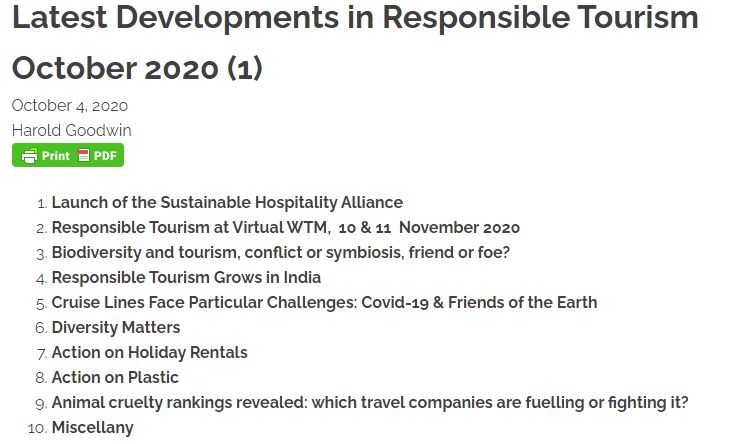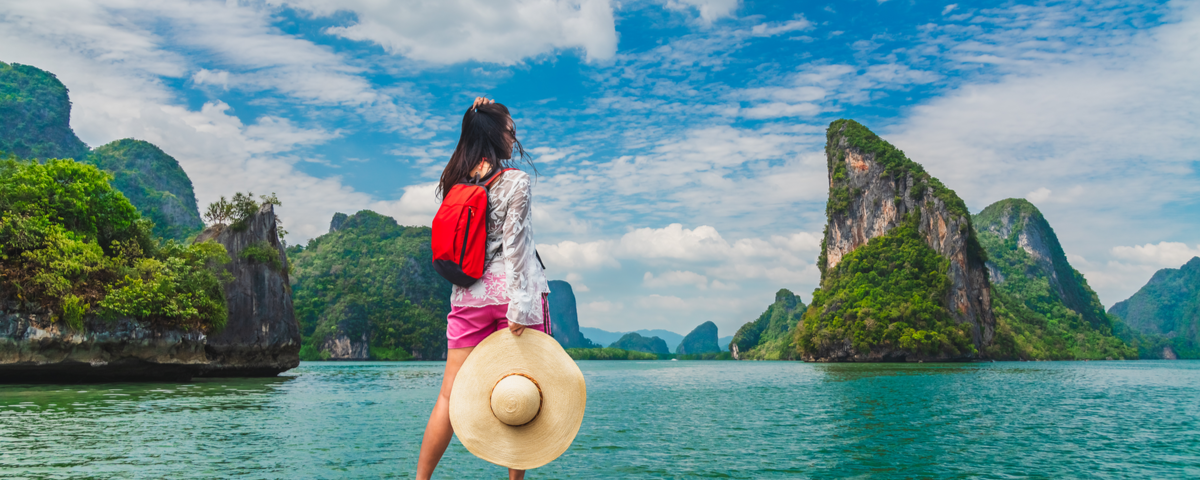The theme of WTM Virtual this November is Recover, Rebuild, Innovate. While recognising that the pandemic is far from over and that many countries are experiencing a second wave, it is important to look beyond survival to recovery. The UN’s Secretary-General has written in a policy brief on COVID-19 and Transforming Tourism of the crisis as “.. an unprecedented opportunity to transform the relationship of tourism with nature, climate and the economy. … to ensure a fair distribution of its benefits and to advance the transition towards a carbon-neutral and resilient tourism economy.
The UK’s Prince of Wales, opening Climate Week, spoke about the scale of the challenge we face:
“The borderless climate, biodiversity and health crises are all symptoms of a planet that has been pushed beyond its planetary boundaries. Without swift and immediate action, at an unprecedented pace and scale, we will miss the window of opportunity to ‘reset’ for a ‘green / blue recovery’ and a more sustainable and inclusive future. In other words, the global pandemic is a wake-up call we simply cannot ignore. “
We have been ignoring it for decades, hoping presumably that someone else would deal with the problems, as the prince remarked: “ I have long observed that people tend not to act until there is a real crisis. …. that crisis has been with us for far too many years – decried, denigrated and denied. It is now rapidly becoming a comprehensive catastrophe that will dwarf the impact of the Coronavirus pandemic.”
We cannot shield humanity from the impacts of environmental destruction. As individuals, we can take steps to isolate ourselves and keep COVID-19 at bay; we can mitigate against climate change by moving away from coasts to higher land. But one thing we have learned from the pandemic is that while we can through individual action avoid or lessen some of the impacts of COVID-19 we cannot isolate ourselves from consequences for the societies in which we live, work and play.
A hotel can create a COVID secure environment but the guest needs to travel safely to the check-in counter and feel safe to explore the neighbourhood along with locals and other travellers. In our sector, we are all dependent on what others in our industry are doing; and on the effectiveness of the safety measures taken in the public realm in destinations. There are very significant limits to what individual businesses can do to assure potential clients that it is safe to travel.
The Prince of Wales has called for a ‘Marshall-like Plan for Nature, People and Planet’. We are perhaps more modestly asking ‘Can we make Tourism Better?’ with eight live panels, with an opportunity for Q&A, and some additional on-demand material seeking to answer this fundamental question.
Resilience & COVID-19 – 10th November, 10:30-11:30am
The tourist has to find the risks acceptable throughout their journey – the tourist has to be assured that the risk from the premises or transport, the employees, other travellers and the local population is acceptably low.
Build Back Better – 10th November, 12-1pm
We’ll look at the different ways in which five destinations are seeking to change the way tourism works to take the opportunity provided by COVID-19 to build back better for communities and their environment.
Tourism and Biodiversity, Friend or Foe – 10th November, 2-3pm
This round table discussion will focus on the positive steps the sector can take to make a substantial contribution to the conservation of biodiversity. We shall look at how tourism compares with other industries and at what policymakers, accommodation providers, tour operators and guides can do to take responsibility for ensuring that tourism makes a positive contribution to the maintenance of biodiversity.
Decarbonising Aviation – 11th November, 3:30-4:30pm
How quickly will the airlines take up zero-emissions flight? How should the travel and tourism sector respond if aviation, a major supplier, fails to adopt clean technology fast enough, presenting a significant risk to our industry in general and the many destinations dependent upon it? How can we best encourage the aviation industry, manufacturers, airports and airlines to make rapid change?
Responsible Tourism in India – 11th November, 10:30 – 11:30am
India is now arguably leading the world in adopting a Responsible Tourism approach. In this round table panel, we shall hear from policymakers about their experience with Responsible Tourism and about what it has to offer.
Racism in Tourism – 11th November 2-3pm
We’ll discuss the ways in which racism affects our sector through employment practices, product design, marketing and promotion in the source markets, and through host-guest interactions in destinations. How can we best take responsibility to address this?
Certification and Consumer Choice – 11th November 3:30-4:30pm
We’ll discuss where certification is today and what it holds for the future. Are there too many schemes? What strategies could deliver more transparent consumer information? What can be done to improve certification and drive the sustainability agenda forward? How will health and safety shape sustainable tourism?
Can we make tourism better? – 11th November 5-6pm
The panel will reflect on this year’s WTM Responsible Tourism sessions and consider how we move forward to make better tourism for travellers and holidaymakers; for destinations and for the communities who live there; and for businesses in the source markets and destinations. What principles should inform the way we recover our industry and work to use tourism to make better places for people to live in? What role should governments play? How do we practically make tourism better?
More on these issues and Virtual WTM in Responsible Tourism News

You may also be interested in…
- Biodiversity, eco-system services and tourism – conflict or symbiosis?
- How are biodiversity loss and human disease affecting tourism?
- Which trends should guide tourism’s recovery?


